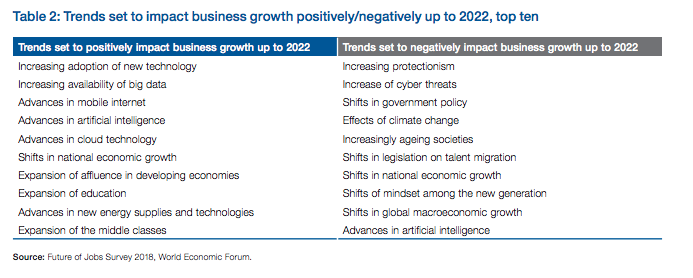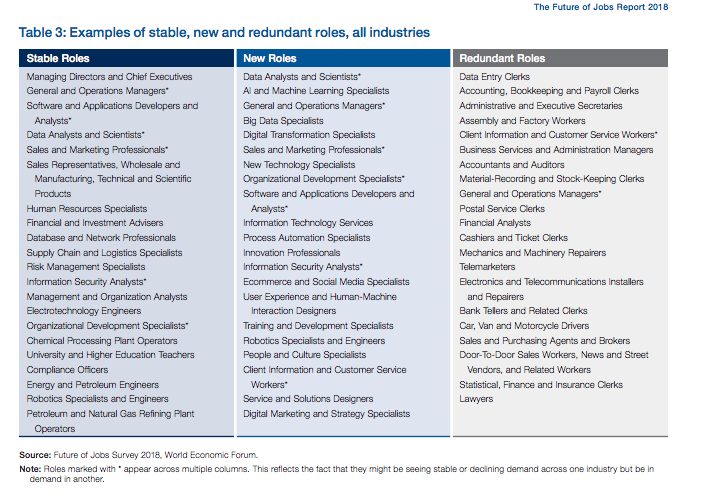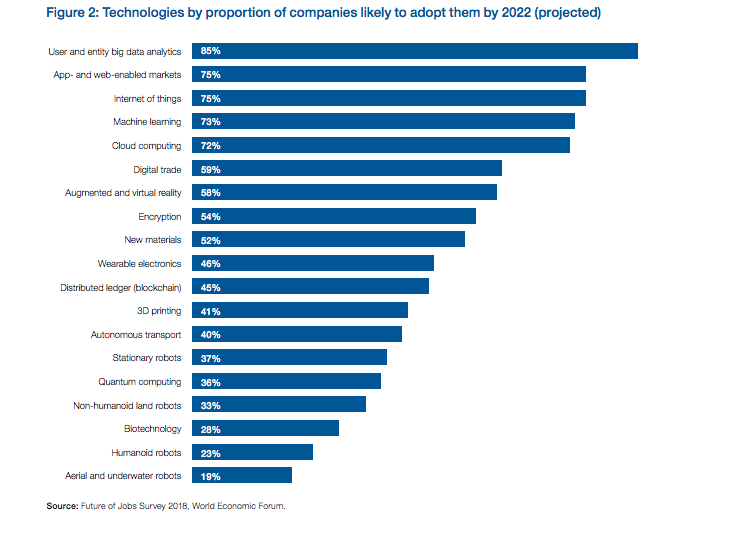
Many concerns have been raised about what the future of jobs will be. Major technological change is leading to the rapid development of artificial intelligence and robotics which are better placed than humans to do certain types of work. Some jobs may become obsolete while other new types of jobs will be likely to emerge. The World Economic Forum has helpfully carried out research into this topic, to understand how jobs will look in the future, and who will be affected and how.
The World Economic Forum Future of Jobs Report 2018 provides a comprehensive insight of what is likely to happen in the world of work in the future.
Importantly, there are major drivers of change in terms of technological advancement that are likely to lead to changes in the future of work. The World Economic Forum identifies these as being cloud technology, high speed mobile internet that is everywhere, widescale use of analytics for big data and artificial intelligence. The report shows that by 2022, adoption of new technologies is likely to have been accelerated. By this same year, business are likely to have invested very heavily in machine learning and artificial intelligence solutions. At the same time, robotization is expected to increase but not at such an accelerated speed. Science fiction style humanoid robots are not likely to be developed to the point they are commercialised to any large degree. Where this does occur it is most likely to happen in service industries. However non-humanoid robots and other forms of robotics are likely to advance fairly considerably in all kinds of roles across all sectors.

Labour costs are a concern for many companies, and some are changing their location to ensure they can access skilled talent. It is reported that 64% of companies are worried about the costs of hiring people. Employment law is also a significant issue in some places which is driving companies to change their geographical spread of operations. Given the combined issue of labour costs and the increasing technological capability of technology to carry out some types of roles, it is expected that the number of jobs will reduce. In fact, the report states that, “Nearly 50% of companies expect that automation will lead to some reduction in their full-time workforce by 2022. At the same time, automation is expected to lead to the creation of new roles for people in almost 40% of companies surveyed. This strongly suggests that the situation is not as simple as machines replacing people.

Indeed, it is expected that there will be new jobs where humans and robotics interact to increase productivity and to do jobs more effectively. Machines are likely to have a greater impact in some areas than others, and it is anticipated that by 2022 machines will be responsible for almost two-thirds of data processing and management types of tasks, and more decision making will be automated. For this reason, particular types of jobs for which there is expected to be increased demand include Data Analysts, Data Scientists, Social Media Specialists, Software Developers and Application Developers. There is also anticipated to be an increasing need for skills that are very “people” focused, such as customer service, marketing, training and organisational development.

The significant changes in the workforce, and in particular the decline in certain types of roles suggests that the future of work will require upskilling for some types of workers. This is believed to be likely to apply to 54% of workers who will need new skills. Employees will need to be more proficient in certain types of technology, but it is anticipated that there will be a growth in the need for more human skills like creativity, initiative and critical thinking, as well as emotional intelligence. Workers will need to make sure they take proactive steps to gain the skills needed to help them ensure they remain in the workforce. One thing is clear: there is significant change likely in the workforce of the future, even as early as the year 2022. Automation is coming and employees need to be ready, working towards gaining skills that will allow them to add value in this brave new world.

Paula Newton is a business writer, editor and management consultant with extensive experience writing and consulting for both start-ups and long established companies. She has ten years management and leadership experience gained at BSkyB in London and Viva Travel Guides in Quito, Ecuador, giving her a depth of insight into innovation in international business. With an MBA from the University of Hull and many years of experience running her own business consultancy, Paula’s background allows her to connect with a diverse range of clients, including cutting edge technology and web-based start-ups but also multinationals in need of assistance. Paula has played a defining role in shaping organizational strategy for a wide range of different organizations, including for-profit, NGOs and charities. Paula has also served on the Board of Directors for the South American Explorers Club in Quito, Ecuador.










